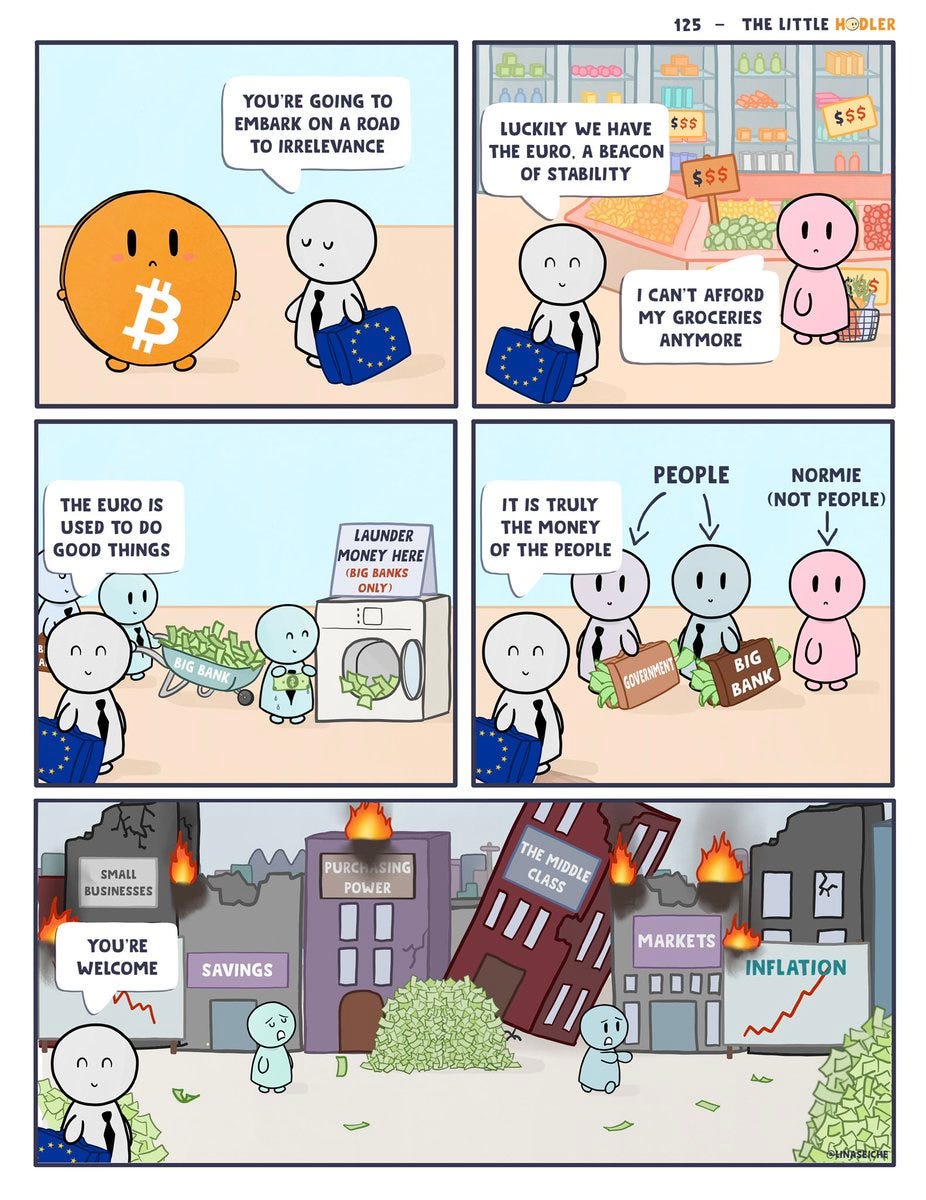Bitcoin Tech Talk #321
What I've been working on
Bitcoin, Politics and Faith - My panel from Thank God for Bitcoin back in May is up. Sadly, all three candidates (Blake Masters, Jesse Sullivan and Bruce Fenton) lost their bid for office, though the clear trend is toward politicians caring a lot more about Bitcoin. What’s obvious from this interview is that there’s still some conflation of Bitcoin with altcoins and that more clarification for the general public and politicians is needed.
Part 2 Anna Tutova Interview - Part 2 of my interview with Anna is up. I talk about what makes Bitcoin different, the stupid objection that Bitcoin can be manipulated by large institutions with lots of money (so can everything else). The immorality of altcoins is really a topic that needs a thorough examination. I hope to write a book in the next year about it (after the current one). In the meantime, we have to rely on making this distinction on shows like this.
Dominion - I read this book recently and it’s an very interesting look at Christianity’s influence throughout history. I really appreciated the deep history of not just the church, but all the intellectual movements afterwards, like the Enlightenment, Marxism, Nietzschism, even free love and Wokism. The main message of the book is that Christian assumptions undergird pretty much all modern philosophies and political thought. I enjoyed it and recommend it to people that like reading a non-conventional take on history.
What I'm up to
Peru and Colombia - I’m in Cuzco, Peru, to visit Machu Picchu and Rainbow Mountain. I would love to get recommendations on what food to eat or what things I need to check out. Similarly, I’ll be going to Bogota to check out Colombia. Similar to Peru, I’d appreciate recommendatinos.
Nullification - I’m reading Tom Woods’ excellent book on the way the US government was designed and the ideas behind state sovereignty. I have to say that so far, I’m disappointed in Andrew Jackson for his role in the Nullification crisis and asserting federal power in a way that expanded the powers of the presidency. That legacy, unfortunately, has been abused every which way since then. States really should have more sovereignty and the idea is very intriguing, especially now that Bitcoin exists. I’ll write more about it when I finish the book.
Morocco - I’ll be traveling there mid-to-late December. I really have no clue what to see there, so I’m hoping some of you can give me some advice on what to do. Also very interested to see how easily I can exchange Bitcoin.
Tweet of the Week
What I’m Shilling
Unchained Capital is a sponsor of this newsletter. I am an advisor and proud to be a part of a company that’s enhancing security for Bitcoin holders. If you need multisig, collaborative custody or bitcoin native financial services, learn more here.
Bitcoin
New Bitcoin Address Classification Technique - A new paper comes up with a novel way to do graph analysis to classify various Bitcoin addresses. The classification is clearly an attempt to make better use of blockchain data to capture “illegal” transactions. This is the next level of chain analysis which is getting more sophisticated. In the future CoinJoin and similar technologies may not be enough. Wallets would do well to try to break some of the techniques laid out in the paper. Note that the paper was sponsored by the National Key R&D Program of China.
Why Proof of Reserves isn’t Enough - James Lavish has a detailed explanation of what Proof-of-Assets is and why Binance’s recent declaration is not a good enough reason to trust them. The post is great to learn how a Merklized proof-of-assets is and how it works. However, as he points out, proof-of-reserve is nothing without proof-of-liabilities. As he says, the lesson from this FTX mess shouldn’t be that we regulate exchanges more, instead, we should just hold our own keys.
Full-RBF causing trouble - There was an interesting post by the CEO of a company that has been using zero-conf transactions for his business complaining about RBF. The discussion was long, but for me, this behavior is so indicative of the fiat mindset. He wants his business model to continue, instead of conforming to the network. As some people pointed out, Lightning is a fine alternative if you need speed, but obviously, the guy doesn’t want to change the architecture of his business. This is why many businesses in 2017 wanted 2MB blocks. Bitcoin changes itself for no one.
Lightning
Channel Jamming Attack - Antoine Riard comes up with an interesting mitigation to the Channel Jamming attack and it’s by using a reputation system within the Lightning Network. I’m surprised this wasn’t something people thought of earlier as forced channel closes should be provable on-chain. The fact that running a lightning node and opening channels costs money mitigates for the main weakness of reputation systems, the dreaded Sybil attack. I honestly think a reputation system like this can really open up more channels and make the Lightning Network much more robust.
Lightning Privacy Research - This is a book in progress and goes over all the considerations when thinking about Lightning Transaction Privacy. There are a bunch of different topics, including the on-chain channel opening privacy, routing and much more. I’m excited that this is getting more study and I would love to see an analysis of submarine swaps as part of the privacy research.
Almaeda Yield Generator - This is the humorous name for the latest c-lightning release 22.11. The release comes with an easier way to load/unload plugins and performance improvements. More importantly, they’re moving to a faster release cycle, as the Lightning protocol changes are fairly frequent still and making users wait too long is not likely to be a good experience. I’m a bit torn about this since it’s still money and I think a move-fast-and-break-things mentality is the wrong one for Bitcoin. That said, this is a second layer and the monetary loss is likely not to be as much and there are some really cool applications that can be built on it.
Economics, Engineering, Etc.
Reinventing Money - Gigi writes in a manifesto on what makes Bitcoin money and what the properties of money are. As he points out, we’ve been confused about money, believing that it needs to earn yield, because that’s the one carrot that the controllers of money use to make their money attractive. Altcoins almost always try to make Bitcoin more like fiat money. That is a futile endeavor. It is our conception of money that’s confused, not Bitcoin.
Node World Order - Michael Goldstein goes through a first-principles based argument against gold and for Bitcoin. The piece draws heavily from the works of Hoppe and is well worth reading, just to absorb all the different Austrian economics lessons embedded in it. The main problem with gold is that there are several properties which encourage centralization: portability, verifiability and security. All of these inevitably lead to some trust and that’s what Bitcoin fixes. One of those legendary articles that I suspect will become a book.
Comprehensive FTX review - Many people have opined on FTX, but this is probably the most thorough treatment of what happened. The striking thing about this story is just how abundant the evidence was that there was serious fraud. That the fraud was not only allowed to continue, but in many cases catalyzed by these people are quite damning. This is why fiat money needs to die. It creates way too much waste like this.
Quick Hits
ECB latest to declare BTC dead - We’re definitely past the “First they ignore you” stage.
Internet-less Bitcoin TX - This is a service in Africa using the mobile network and is custodial, but nevertheless, usable without the internet.
Kraken Settlement - Kraken paid around $350k to settle allegations by the Department of Justice that they violated sanctions against Iran.
Exchange Data Breach - A Canadian exchange leaked a bunch of user data. So yea, not your server, not your data.
BitcoinTalk User Flex - A user on BitcoinTalk provided a signature from a public key that mined a block in January 2009.
Fiat delenda est.









